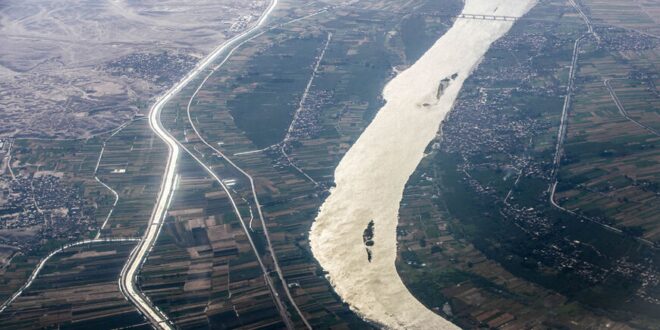Egypt’s Irrigation Ministry revealed four projects designed to reduce water waste, combat the growing need for water and help ease the negative effects of the GERD on its irrigation system.
Egypt’s Ministry of Irrigation and Water Resources revealed May 2 four projects and plans to reduce water waste in the country, counter the growing need for water in the future and help mitigate the negative impact of the Grand Ethiopian Renaissance Dam (GERD) on its irrigation system.
Masrawy news portal quoted Mohamed Ghanem, spokesman for the Ministry of Irrigation and Water Resources, as saying that they have prepared for all potential scenarios, including worst-case scenarios, by adopting a good management system for every drop of water.
He noted that projects are currently underway as part of the plan, most notably the rehabilitation and lining of canals and drains at a cost of 80 billion Egyptian pounds ($5.1 million), and that the project will limit water loss and allow a better water flow.
The second project, he said, is to build and maintain 92 highly efficient pumping and lifting stations, and the third consists of water treatment plants, similarly to the Bahr el-Baqar plant where 5 million cubic meters of water are treated daily, and the new el- Hamam plant which serves the New Delta projects with a capacity of 6 million cubic meters of water per day.
The Egyptian Cabinet announced in a May 5 Facebook post that the ministry has resorted to desalination as a way to counter the growing need for water in the future due to population growth and additional development activities, at a time when Egypt’s share of the Nile waters remains unchanged.
Ghanem said that the fourth project aims to encourage farmers to use modern irrigation systems in dryland and old lands in order to reduce water waste, given that traditional farming practices consume the largest proportion of the Nile waters.
Mohamed Daoud, water resources specialist and professor at the National Water Research Center, told Al-Monitor that Egypt mainly depends on its share of the Nile waters, namely 97% of the country’s overall water resources, to meet its water needs.
He said, “The increased population growth and development activities in Egypt have dropped the per capita water share to less than 600 cubic meters annually, as the population exceeds 100 million.”
Daoud noted, “It was necessary for us to develop and implement projects to handle our share of the water in a way to avoid any water resources management problems in the future.”
He added, “Egypt suffers from water shortages of up to 20 billion cubic meters per year, which forced the government to find some alternatives and solutions in order to increase water resources and bridge the gap between water resources and growing water demand in a way to reduce water shortages.”
Egyptian Minister of Water Resources and Irrigation, Mohamed Abdel Aty, told Climate Dialogues that was virtually held May 5, “Egypt is facing major challenges in the water sector, with 97% of its renewable water resources coming from outside the border. In addition, Ethiopia’s unilateral measures regarding the GERD increase the challenges facing Egypt in the water sector.”
He continued, “The National Water Resources Plan 2037, which is based on four axes, consists of optimizing water use, improving water quality, improving availability of water resources and improving the enabling environment for optimal water management.”
Egypt fears that the operation of the GERD that Addis Ababa built on the Blue Nile affects its water supplies from the Nile River, on which Egypt depends for 97% of its irrigation and drinking water.
The GERD talks between Egypt, Ethiopia and Sudan have continued to be stalled to date, after the last round of talks held in April in Kinshasa, the capital of the Democratic Republic of the Congo, failed to bring an agreement between the parties.
Abbas Sharaqi, director of the Natural Resources Department at the Institute of African Studies and Research at the University of Cairo, told Al-Monitor, “Egypt will not abandon its historical rights to water whatsoever, because the matter of the Nile water is a matter of life and death. We are already suffering from water shortages and Egypt will not allow such shortages to grow bigger [just] because its share of the Nile was affected.”
He said, “Egypt paid billions of pounds to address the shortages, meet its future needs for water and limit the potential negative effects of the GERD.”
Sharaqi noted, “The recently implemented projects in Egypt will not be able to compensate for the water flowing from the Nile. There will be damages to Egypt if [Ethiopia] goes ahead with the second filling of the GERD reservoir in the absence of an agreement with the two other countries.”
He added, “These projects are necessary in order to meet the growing needs for water, especially in the development projects that the Egyptian government is conducting — be they the new agricultural or industrial projects, or new cities.”
Nader Noureddin, professor of water resources at Cairo University, told Al-Monitor over the phone, “These plans and projects consist of proactive measures to reduce the damage that the GERD construction and the storage of 75 billion cubic meters of water behind it could cause.”
He noted, “These plans will supply Egypt with a large amount of water, as water shortages are expected to range between 10 billion to 12 billion cubic meters, equally divided between Egypt and Sudan, due to the filling operation of the GERD.”
Sharaqi concluded, “Egypt will at all times defend our legitimate water rights.” He said that he hopes the talks on the GERD will lead to a solution that suits the three countries.
 Eurasia Press & News
Eurasia Press & News




